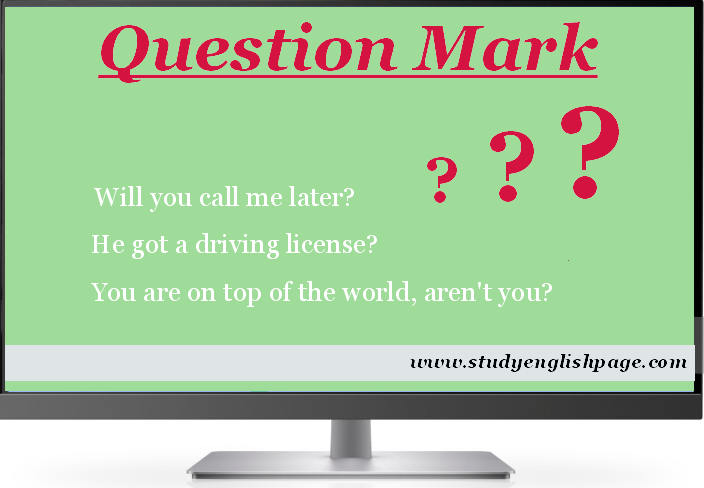Question Mark
What is a question mark? It is one of the punctuation marks. A question mark is placed at the end of a sentence or phrase to show a direct question.
- Do you want to help the poor?
You may have heard or read some
other terms like the sign of interrogation, interrogation point, question
point, or note of interrogation. All of these are alternative words that can be
used in place of the question mark.
Why Question Mark?
What is the main purpose of a
question mark? Simply, we can say that it indicates a question.
- What is the best color that you like the most?
Sometimes, we phrase a question
as an imperative or a declarative. In a speech, a raising voice at the end of a
sentence indicates that the sentence is a question, but not a statement. In
writing, a question mark gives a signal to readers that the sentence is a
question. This is the way to express doubt, surprise, or disbelief.
- You are asking me about your shoes?
- Jump over the fence? Never!
A closer look indicates that the question mark can be tricky to use. It can be easy to misuse the question mark.
Uses of Question Mark
After a Direct Question
One of the common uses of a
question mark is after a direct question. A question mark is used as a terminal
punctuation mark after a direct question.
- Did they enjoy the party last night?
- Was Lisa doing something when you met her at her home?
After an Indirect Question
Indirect questions are
statements. They just report a question. They may have question words. We don’t
use a question mark after an indirect question.
- She asked if I could help her.
- You don’t know how I manage my expenses.
After a Rhetorical Question
Rhetorical questions are
statements or demands in the form of questions. They don’t need answers. They
may be punctuated by a period, an exclamation mark, or a question mark.
- Why don’t we go outside?
- Will you stop asking stupid questions?
- Will you stop asking stupid questions!
- If you tickle him, does he not laugh?
After a Tag Question
We use a question mark after a
tag question which is a half statement and half question.
- Lisa always teaches something new, doesn’t she?
- You are on top of the world, aren’t you?
Question Having an Abbreviation
A question that has an
abbreviation at the end is ended with a period and a question mark without
space.
- Have you visited Washington D.C.?
Question Inflection
When we want to turn a sentence
like a statement into a question, we can use a question mark. The question mark
is used to add question inflection.
- He got a driving license?
- He got the driving license, eh?
In Quotation
It follows logic. A question
mark is placed inside the quotation marks when the question mark is within the
quoted material or related to the question inside the quotations.
- The question “Can he light the fire?” is useless.
- Have you studied the novel “Pride and Prejudice”?
As a Part of a Title
If a question mark is part of
an underlined title, the question mark is also underlined.
- Has Ali read Hamlet?
In the case of italicized
title, the question mark is also italicized.
- Have you ever read Pride and
Prejudice?
If a question mark is part of a
title, the question mark is added at the end rather than another punctuation
mark like a period.
- My favorite book is What is grammar?
Expressing Uncertainty
A question
mark is used in brackets or parentheses to show uncertainty. Some writers use
space between the uncertain word and the opening parentheses.
- They have arrested 20(?) smugglers.
- They have arrested 20 (?) smugglers.
When One Question Mark isn’t Enough
When
you want to make the end of a sentence more beautiful, you can use an extra
punctuation mark. This is used when you want to convey something exciting or
surprising.
- Do you believe that he is a millionaire???
- Do you believe that he is a millionaire?!
- Do you believe that he is a millionaire!?
A Word after Question Mark
A word that comes after a
question mark is capitalized. Remember that some writers overlook this rule.
- What is your plan? Park? Football? Reading?
Omit the Comma
A question mark and a comma can
never be paired.
- “What did Lisa say?,” asked John. Incorrect
- “What did Lisa say,?” Asked John. Incorrect
- “What did Lisa say?” asked John. Correct





0 Comments